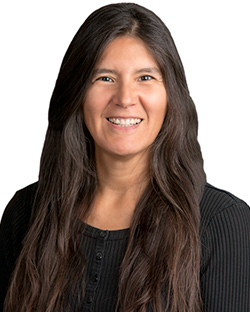
The series of conversations on Decolonizing Global Health Research seek to engage fundamental questions: What does decolonisation mean? Can scientific public health and humanitarian research be decolonised? If so, how? What are the ethical challenges of decolonized research methods? How can we design and develop research methods that meaningfully engage with marginalized communities? How can people’s deeply personal and generational experiences with structural racism and intersectional violence sensibly be translated into practical responses and policies?
These questions stem from our commitment to acknowledge personal and collective biases and positionalities in relation to global health and humanitarianism. We see these conversation as a fundamental step to foster the elaboration of methodologies, collaborations and actions that center decolonial and intersectional lenses.
Speaker
Professor Deborah McGregor joined York University’s Osgoode Hall law faculty in 2015 as a cross-appointee with the Faculty of Environmental Studies. Professor McGregor’s research has focused on Indigenous knowledge systems and their various applications in diverse contexts including water and environmental governance, environmental justice, forest policy and management, and sustainable development. Her research has been published in a variety of national and international journals and she has delivered numerous public and academic presentations relating to Indigenous knowledge systems, governance and sustainability.
Register
Registration is now closed. To hear about future events in this series, you can sign up to our Newsletter, and follow us on Twitter, Facebook, and LinkedIn.
Series Background
Following the widespread protests in support of the Black Lives Matter movement, we as affiliates at York University Dahdaleh Institute for Global Health Research drafted and signed a statement that reflects the ways structural racism and violence intersect with our areas of work. In the statement we committed to work towards decolonising global health and addressing racial inequality in and through the research that we conduct at the institute.
In the statement we rejected passive and harmful government policies that exclude peoples and communities from healthy environments, from accessing and benefiting from public health responses, and from seeking protection across international borders. We committed to continue to listen to, work with, and amplify the perspectives of racialized and marginalised communities in Canada and beyond. The latter implicates engaging with communities and partners in non-hierarchical ways to honour perspectives and interests, as well as rethinking, learning, and critically examining what decolonised approaches to global health research.
Conveners
Maissaa Almustafa, Research Fellow, Global Health & Wellness of Refugees & Migrants
Linn Biorklun Belliveau, Research Fellow, Health, Migration, and Climate Change
James Stinson, Research Fellow, Planetary Health & Education

